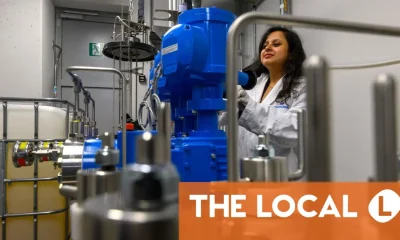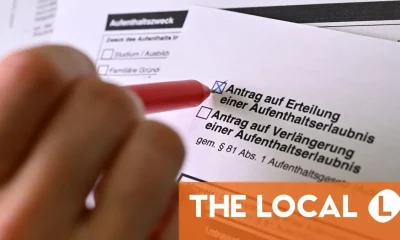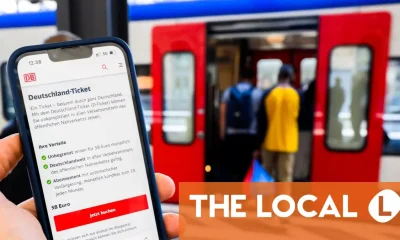Politicians returned to the Bundestag on Wednesday after a summer break, pledging to ease the financial burden on residents.
The German cabinet on Wednesday approved a series of tax relief measures aimed at commuters, the catering industry, farmers, small businesses and volunteers.
Under the plans, which the government wants to implement from 2026, the commuter allowance will rise, VAT on restaurant meals will be cut and the reduction of subsidies for agricultural diesel will be rolled back.
These plans were previously outlined by the coalition agreement, made up of the centre-right Christian Democrats (CDU), its sister party the CSU and the centre-left Social Democrats (SPD).
The aim is “to provide as broad relief as possible where the crises of recent years – the coronavirus pandemic or rising energy costs and inflation – have increased costs for citizens,” said Finance Minister Lars Klingbeil.
READ ALSO: What Germany’s new 2025 budget means for you
What does the VAT cut mean?
Germany is planning to reduce the value added tax (VAT) rate on food in the catering industry from the current 19 percent to seven percent from the beginning of next year.
As well as traditional outlets like restaurants, bakeries, butchers and take-aways, catering service providers for daycares, schools and hospitals will also benefit from the relief under the plans.
Advertisement
The tax reduction, which will only apply to food (not drinks), is designed to bolster a sector hit hard by the covid pandemic and the energy crisis.
Although it is hoped businesses will pass on savings to diners, there is no obligation to do so.
The government estimates that residents and businesses will save €3.6 billion annually.
Germany previously introduced a VAT cut on meals in restaurants and cafes during the pandemic but the government raised it back up to 19 percent at the start of 2024.
READ ALSO: Taxes to immigration – the major challenges Germany is facing this autumn
How is the commuter allowance changing?
If the proposals get the green light, the commuter allowance between home and workplace will go up to a rate of 38 cents per kilometre from the very first kilometre. At the moment, commuters can claim 30 cents per kilometre, with the higher rate only kicking in from the 21st kilometre.
The Finance Ministry provided some examples: For a daily commute of ten kilometres (five days a week), workers would be able to claim an extra €176 a year in income-related expenses.
And for a 20-kilometre commute, the additional amount is estimated to amount to €352 a year.
The ministry estimates the reform will cost the state around €1.1 billion in 2026, rising to about €1.9 billion annually from 2027.
According to the draft, the measures in total would lead to tax revenue shortfalls of €4.8 billion in 2026. For the years 2027 to 2030, annual shortfalls between €5.7 billion and €6.1 billion are expected.
Drivers on the Autobahn near Berlin. Photo: picture alliance/dpa | Sebastian Gollnow
Tax relief for farmers
Subsidies for agricultural diesel will be fully reinstated, the Finance Ministry confirmed, easing pressure on farms after months of protests.
The government had scrapped the rebate at the end of 2023 during the budget crisis, sparking widespread anger in the sector. Restoring it is expected to cost around €430 million a year, according to the Agriculture Ministry.
READ ALSO: Do Germans support farmer protests?
Support for smaller firms and startups
Alongside the tax measures, the cabinet signed off on several other draft laws on Wednesday. These include the so-called Location Promotion Act, designed to encourage private investment in infrastructure and renewable energy.
The bill would also improve financing conditions for smaller firms and startups, Klingbeil said, adding that the government wants to reduce “bureaucracy in the financial market sector”.
Relief for volunteers
Those who volunteer are to also receive more tax advantages under the proposals. The Übungsleiterpauschale (exercise leader allowance) will increase from €3,000 to €3,300 per year under the plans, while the Ehrenamtspauschale (volunteer allowance) will rise from €840 to €960 per year.
Advertisement
What’s the initial reaction?
While many will welcome them, the tax relief plans have also been met with criticism.
Economist Veronika Grimm told the Rheinische Post newspaper, that the targeted proposals wont help across the board.
“Tax cuts for individual interest groups and commuting citizens are heading in completely the wrong direction,” she said.
Grimm added that the structural challenges Germany’s economy is facing cannot be solved in this way.
The Federal Environment Agency also took a critical view of the commuter allowance, arguing that it encourages commuting by car rather than public transport, which is more harmful to the climate.
The drafts still need to be approved in the Bundestag and Bundesrat.





































